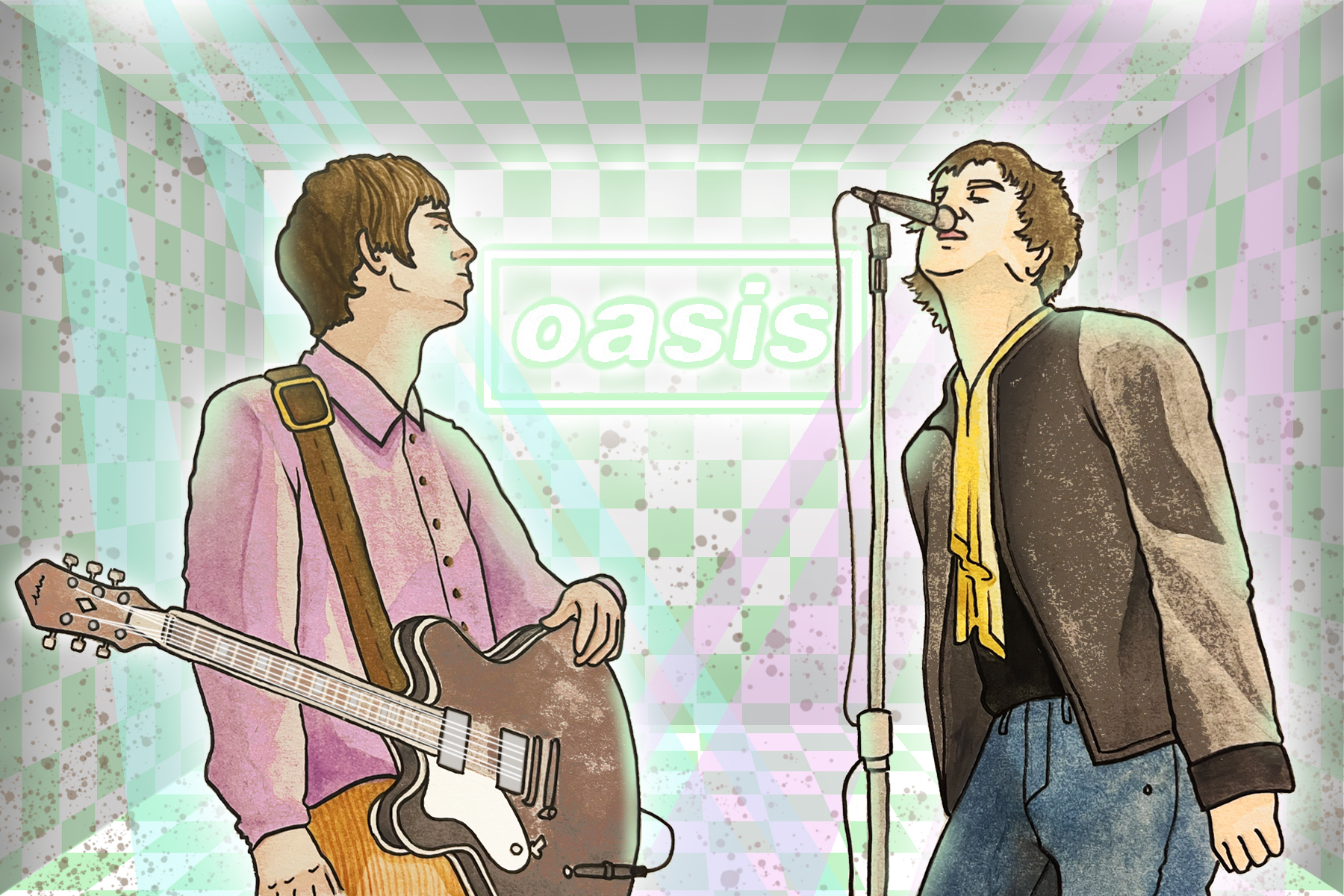Rock bands don’t always need to be intricate to be memorable, and few bands have demonstrated this quite like Oasis. In the mid-1990s, rock’s most popular sub-genres — grunge in the US and shoegaze in the UK — were dwindling; something new had to inhabit the space. Enter Oasis, a quintet from the working-class city of Manchester, England. Influenced by a slew of British legends such as The Beatles, Sex Pistols and The Jam, they honed their sound and became successful in their home country.
Their presence signified a new direction for rock, as the scuzzy rage of grunge and the discordant gloominess of shoegaze waned on both sides of the Atlantic. Filling the niche with music that carried a no-nonsense attitude and recalled classic melodies, Oasis’s debut album “Definitely Maybe” (1994) sold tremendously well in the UK and was met with critical acclaim. Their success would continue with no sophomore slump to deter them when they released their follow-up effort. In fact, 1995’s “(What’s The Story) Morning Glory?” catapulted them even further into the public eye. A work of ferocity with just the right amount of heart, it not only contributed to Oasis’s success overseas, but it was a tour de force that defined what the band was all about: simplicity serving as the most potent form of power.
While the name suggests tranquil imagery, Oasis is a band that floods the ears. Listeners discover this sensation in just the first 15 seconds of “…Morning Glory?” The vibrant opener, “Hello,” slowly fades in with dim strains of a breezy acoustic guitar before an electric ripple echoes — as if an amp dial is being turned up to the maximum level — to unleash the album’s energy. It is clear from then on that “…Morning Glory?” boasts a dynamic sound palette: “Some Might Say” churns, the title track “Morning Glory” rumbles, “Hey Now!” roars and “Roll With It” swirls. Overall, the album thunders, but its intensity comes off as uplifting rather than unpleasant.
Although “…Morning Glory?” is essentially a flex of rock ‘n’ roll toughness, it’s not without a softer side. Several tracks provide some emotional depth, arguably giving the album an edge over its predecessor, which had offered mostly homogeneous—albeit excellent—songs. Take, for example, the gentle strings and stirring meditations of “Cast No Shadow,”
Here’s a thought for every man / who tries to understand what’s in his hands.
In addition, there are the pleasant harmonies and boisterous whimsicality of “She’s Electric,”
She’s got a sister and God only knows how I’ve missed her/ And on the palm of her hand is a blister.
Most notably, there is “Wonderwall,” Oasis’s best-known track, and the only love song on “…Morning Glory?” Given the historic success of love songs in popular music, it’s no surprise that “Wonderwall” is the Oasis track to receive the most frequent playback. However, it should be acknowledged that the song’s beauty lies not solely in having a romantic sentiment, but in having one with rough edges. Lead singer Liam Gallagher delivers with enough removal to give tenderness without giving too much away. The nasal and slightly uneven quality of his voice prevents the song from seeming saccharine and hints at vulnerability rather than hard-selling it (There are many things that I would like to say to you / but I don’t know how). His singing is unpolished, but its imperfection is its own distinction. It could almost be argued that the band’s charisma was indebted to Gallagher’s voice alone; he simply was Oasis. However, Gallagher wasn’t the only one who gave the band its strength.
If Liam was a manifestation of the tenacity that cast the band into the spotlight, Noel Gallagher was the pillar that ensured they would stay there. Possessing the smoother singing voice, lead guitarist and Liam’s older brother Noel commands “Don’t Look Back in Anger,” the band’s second most popular song. The rousing anthem was not only proof of his ingenuity — he penned all the songs on the album — but that he could hold his own in bringing his songs to life.
“…Morning Glory?” was the first studio album in which both Gallaghers took to lead vocals, outlining the ways Liam and Noel each epitomized Oasis. Liam was the face of the band, performing the songs with unshakable confidence. Meanwhile, Noel was the brain, producing the lyrics and melodies so crucial to the band’s success. While not quite yin-and-yang, “…Morning Glory?” showed just what the brothers were capable of accomplishing together.
“Champagne Supernova” is the album’s aptly named closer. Beginning with the sounds of splashing pools and rainfall, the seven-minute finale transforms into a sublime yawn of power, slowly spiraling until it finally winds to a mellow finish. Along with the rest of the album, it also proves that extracting meaning from Oasis lyrics isn’t necessary for enjoyment. Pondering the logistics of being caught beneath a landslide in the sky is irrelevant — Liam Gallagher admitted he himself didn’t know — but one thing seems certain. A champagne supernova is a self-indulgent, magnificent and mammoth occurrence, much like Oasis itself.
Sadly, Oasis was constrained by the mutual animosity between the Gallagher brothers. Their frequent conflicts culminated in a standstill in 2009, and the band has remained broken up since. The Gallaghers have mostly maintained their hostilities toward each other as they continue their solo careers, but in the last few years, Liam has occasionally acknowledged his brother positively through his music, in his poignant “One of Us” video and, supposedly, in the lyrics of “For What It’s Worth.”
In 2023, there has been increased speculation because Liam and Noel have doled out mixed messages to various media sources on their feelings about a reunion. The 1975 frontman, Matty Healy, recently called for the Gallaghers to reconcile and join the bandwagon — so to speak. Liam replied to Healy with his signature aloofness, but interestingly, Gallagher didn’t outright dismiss the call.
With any hope, continued calls for a reunion may eventually result in action, but admittedly, it’s a long shot when the brothers appear to be enjoying the fruits of their individual pursuits. No matter what happens, though, “(What’s The Story) Morning Glory?” will continue to transcend time as a shining example of their talents. The possibility of replicating its success will always be within reach, so long as Liam and Noel choose not to look back in anger — or ahead, for that matter.

















